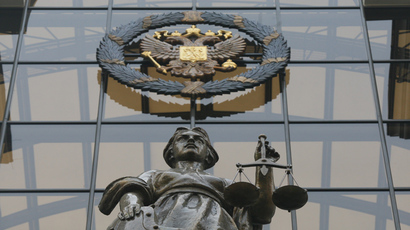New bill equates popular bloggers to mass media

Russian lawmakers suggest that internet authors whose works attract 10,000 or more visitors a day should be accredited as journalists, receiving all rights and responsibilities commensurate with this status.
The changes in state attitude to the blogosphere are the main part of the fresh package of amendments to the Law on Mass Media, Izvestia daily reported on Wednesday quoting an unnamed parliamentary source. According to the source, the figure of 10,000 daily visitors is already fixed in the draft papers, but did not specify if this was a single-time threshold or a mean index.
When a blogger signs for mass media accreditation he or she will automatically have an obligation to observe all legal norms applied to registered news outlets - the obligation to verify information before distributing it and responsibility for the consequences caused by the publications.
Izvestia’s source noted that the new amendment was modeled on a scheme already in use in Israel.
The news was confirmed by Vadim Dengin, first deputy head of the Duma Committee for Information Technology.
“Every blogger whose blog gets past a certain popularity threshold can be equated to mass media. Other people can share opinions expressed in blogs and expressing information with personal evaluations makes bloggers personalities of a national scale. It is natural that they are made equal with the mass media. They must share responsibility for their words and work within legal parameters,” the MP said.
Popular Russian bloggers are skeptical about the initiative. Stanislav Apetyan, who writes under nickname Politrash on the Livejournal platform, noted that a blogger can be brought to responsibility for slander like any other person, and the law on mass media is not necessary for this procedure. Another blogger, Edward Chesnokov, pointed out that the internet is extremely decentralized and the authorities do not have real power over services that are legally and technically located in other countries.
According to the current Russian law, the consumer rights agency Rospotrebnadzor monitors the internet and can order service providers to block any website hosting pages with forbidden materials. The grounds for such move can be anything from copyright violation to extremism and, for example, promoting suicide among minors. After the blockage the case must be heard by a court (the case can be initiated by resource owners or prosecutors) that gives the ultimate decision over the questionable content. If the court does not step in the blockage is lifted automatically.
Another bill that is currently in development obliges major Internet service providers to keep 12-hour records of traffic and present them to security agents on demand, without a court warrant.
In October last year, Russia’s interior minister personally asked the lawmakers to introduce tougher laws against provocations on the internet. Vladimir Kolokoltsev warned about extremist groups active on the web and proposed a draft law that introduces criminal responsibility for extremist crimes with use of the internet.
The move was prompted by cases of mass riots in various places, including Moscow, that were coordinated through blogs and Twitter allowing to gather about a thousand protesters in a matter of hours.














